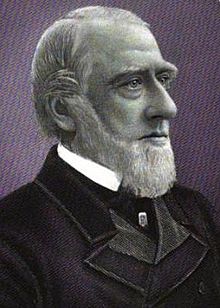J. Gregory Smith
John Gregory Smith (born July 22, 1818 in St. Albans , Vermont ; † November 6, 1891 ibid) was an American politician and governor of the state of Vermont from 1863 to 1865 .
Early years and political advancement
J. Gregory Smith was one of the few Vermont men of his day who received what would be called a full school education. After attending the local Franklin County Grammar School and St. Albans Academy . After graduating in 1834, he went to the University of Vermont , where he took the classical courses for four years and was discharged with an AB . He had decided to follow his father in the profession of lawyer and spent a year preparing for his studies in his office. He then studied law at Yale Law School until 1841 and was then admitted to the Franklin County bar .
After his admission as a lawyer, he worked in this profession in his father's law firm. Together with his father John and brother Worthington, he drove the expansion of the railway lines in Vermont. After his father's death in 1858, he became president of the Vermont Central Railroad and the Vermont & Canada Railroad Companies and played a key role in connecting the New England transport system with that of the Great Lakes . Soon Smith was also doing other business areas such as banking.
From 1861 to 1863, the Vermont Central Railroad's factories were relocated from Northfield to St. Albans, the hometown of their President, John Gregory Smith.
Smith became a member of the Republican Party . From 1858 to 1859 he was a member of the Vermont Senate . He was then a member of the Vermont House of Representatives between 1860 and 1863 , where he was President of the House in 1862. In 1863 he was elected the new governor of his state by a large majority against the Democrat Timothy P. Redfield .
Vermont governor
Smith was inducted into office on October 9, 1863. After being re-elected in 1864, he could remain in office until October 13, 1865. At the beginning of his reign the civil war was still in full swing. Smith supported the federal government's war effort. He also used law to ensure that wounded soldiers in the Vermont area received appropriate medical attention. Another law in his tenure allowed soldiers at war to be elected. After the end of the war in April 1865, soldiers returning home in Vermont had to be reintegrated into society. Industrial production had to be cut back to meet civilian needs. As governor, Smith was very popular with his compatriots.
After retiring from governor, Smith continued his successful business career. The family had stakes in the St. Albans Foundry, the National Car Company, and the Vermont Iron and Car Company, which made railroad cars. He was a co-founder and president of the Northern Pacific Railroad from 1866 to 1872 . In the years 1872, 1880 and 1884 he was head of the delegation of the representatives of Vermont at the respective federal congresses of his party.
family
John Gregory Smith's parents were Troy lawyer and Congressman John Smith and Maria W. Curtis . His brother Worthington was also a member of the United States House of Representatives from 1867 to 1872. He had five other siblings: Harriet Maria, Edward Curtis, Julia Pierpont, Francis Curtis, and Louisa Jen Broeck.
On December 27, 1842, J. Gregory Smith married Ann Eliza Brainerd , the daughter of US Senator Lawrence Brainerd . The couple had six children: George Gregory, Lawrence Brainerd, Annie Brainerd, Edward Curtis (1854–1935), Julia Brainerd, and Helen Lawrence. His son Edward was also governor of Vermont from 1898 to 1900.
His wife, as a writer under Mrs. JG Smith, published a collection of essays entitled " Dawn to Sunrise ", as well as the short stories " Seola " (later republished as " Angels and Women "), " Selma " and " Atla ."
literature
- Robert Sobel and John Raimo (Eds.): Biographical Directory of the Governors of the United States, 1789–1978. Volume 4, Meckler Books, Westport, 1978. 4 volumes.
Web links
- J. Gregory Smith in the database of Find a Grave (English)
- Smith Family Papers in University of Vermont Libraries . Special Collections
- Vermont Railroad Timeline in Vermont Historical Society
| personal data | |
|---|---|
| SURNAME | Smith, J. Gregory |
| ALTERNATIVE NAMES | Smith, John Gregory (full name) |
| BRIEF DESCRIPTION | American politician |
| DATE OF BIRTH | July 22, 1818 |
| PLACE OF BIRTH | St. Albans , Vermont |
| DATE OF DEATH | November 6, 1891 |
| Place of death | St. Albans , Vermont |


